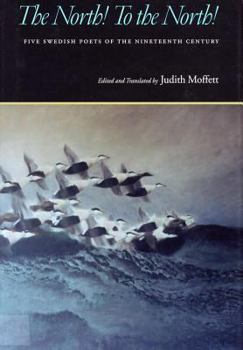The North! to the North!: Five Swedish Poets of the Nineteenth Century
Judith Moffett presents substantial selections of five important nineteenth-century Swedish poets in formal translation, with en face text, critical and biographical introductory essays, and notes. Each of the poets--Esaias Tegn r, Johan Ludvig Runeberg, Viktor Rydberg, Gustaf Fr ding, and Erik Axel Karlfeldt--made a significant contribution to Swedish literature and was justly famous in his own time. Even today, every Swedish student knows the names of these poets.
Noting that much fine Swedish literature remains untranslated, Moffett makes the work of these five important poets available to readers of English. She points out that the dearth of material translated from Swedish to English is particularly notable in poetry, especially rhyming, metrical poetry.
Earlier translators have dealt with the poets represented here, but the results have lacked literary merit. Only rarely, in fact, has their work in translation read like English poetry. In preserving the rhyme and meter of the original works, Moffett has chosen a controversial path, with powerful allies on her side. Those who believe the rhyme and rhythm must be carried out in the translation include the late Joseph Brodsky and Richard Wilbur, who says a formal poem stripped of its form has been "watered down to free verse."
Moffett introduces each poet's section with a biographical essay that sketches the poet's critical reputation as well as his historical milieu. She identifies obscure references and provides other useful information in the notes to the poems.
Several of these poets were members of the Swedish Academy. Karlfeldt was posthumously awarded the Nobel Prize. Even long after his death, Runeberg is regarded as the National Poet of Finland. Fr ding in particular continues to be passionately admired by modern Swedes. Moffett, a formal poet translating formal poetry, makes this splendid body of work accessible to the larger audience it deserves.
Related Subjects
Poetry




